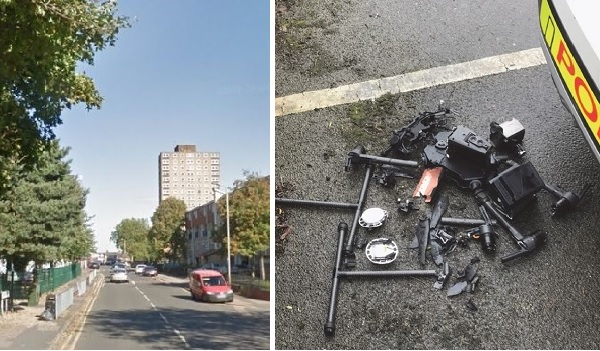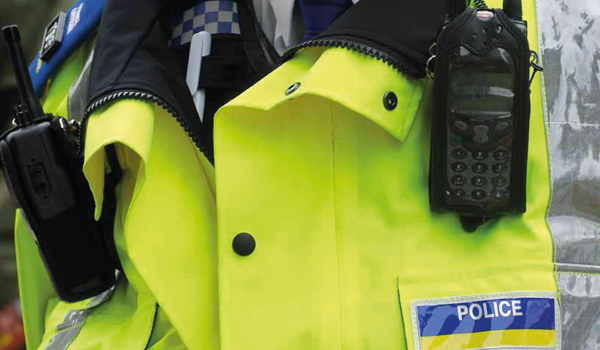Crash warning issued over police drones
A surveillance drone commonly used by police and emergency services throughout the country can malfunction without warning if moisture enters its components, the Air Accident Investigation Branch (AAIB) has found.
The AAIB’s report details incidents of 16 crashes involving DJI Matrice series 200 drones that have taken place in the past 18 months. Seven of the crashes involved devices being flown by police or emergency services operators.
Chinese company DJI is the largest manufacturer of drones with its products accounting for 70 per cent of sales worldwide. On its website, DJI says that the Matrice 200 series drones are “built to endure” strong winds and sub-zero temperatures, and are water and weather resistant, making them suitable for police services, search and rescue teams, and even inspecting offshore rigs.
However, the AAIB has now warned that rain can seep into the devices and cause them to malfunction.
Last June, a Matrice 210 drone being operated by officers from Norfolk Constabulary crashed during a search for a missing person, giving the pilot only “one second’s warning” before falling out of the sky.
The AAIB report said: “The pilot had checked the weather and although very light rain was forecast, it was considered that the conditions were suitable as they were within the manufacturer’s parameters.”
The drone took off and ascended to a height of 260 feet where it remained static and stable for around ten minutes. At this point, the camera began to rotate and a ‘motor overload’ message appeared on operator’s screen.
The AAIB report continued: “The aircraft then began to spin anticlockwise whilst rapidly descending. It subsequently crashed in an open space and was destroyed on impact. There was no damage to persons or property.”
Sergeant Danny Leach told the Eastern Daily Press: “The drone crash was due to a manufacturing fault. The drone was assisting officers searching for a male at the time. It was being flown well within its manufacturer’s safety recommendations, above an open space, in a static position, and at no point was it flown over any members of the public or property.
“Norfolk police assisted fully with the investigation and our recommendation was that this specific model and version of drone should not be flown in a congested area whilst under investigation.
“The manufacturer has since replaced the drone with a different version with no expense to the constabulary; however, we have no plans to use it over congested areas until it has been fully tested and we are confident it can be used safely.”
In March 2019, a Leicestershire Police drone crashed while being flown in the rain about 300 feet above Maidstone Road, in Highfields, Leicester, as part of a training operation.
The 26-year-old pilot, who had 57 hours of experience flying drones, saw the four-propeller DJI Matrice 210 quadcopter spinning out of control falling from the sky, narrowly avoiding members of the public.
The AAIB report said: “The pilot had checked the weather as part of his preparations and although rain was forecast, it was considered the conditions were suitable. After lift-off and control checks were completed satisfactorily, the aircraft was ascended to 300ft to maintain safe separation from nearby buildings. It was still raining but as the flight progressed the rain eased to drizzle.”
The pilot was moving the drone to a new position when he lost control.
The report states: “After approximately five minutes, and whilst the aircraft was being repositioned, it suddenly started to spin rapidly and fell to the ground. The pilot attempted to warn people by shouting, ‘Look out, move’. It took an estimated five seconds for the aircraft to fall to the ground, where it was destroyed on impact. No person was injured.
“Examination of the recorded data showed that a ‘motor blocked’ warning message had been activated and the rear left motor had failed.”
Other incidents involved drones being operated by members of the emergency services in Somerset, Manchester, South Yorkshire, West Midlands and Suffolk.
The UK’s Civil Aviation Authority (CAA) previously released a warning about DJI’s Matrice 200 series after a battery fault in 2018 caused some to stop working in mid-air. Several police forces grounded their drones as a result, but the model remains in use throughout the UK.
In a statement the AAIB said the newly identified vulnerability in the Matrice 200 series drones “poses a risk of injury to people on the ground which is not mitigated by the current UK regulations or published guidance material applicable to operating an unmanned aircraft system.”
The board has asked the CAA to notify users of the potential danger and to specify the conditions that must be met when such drones are flown over populated areas.




